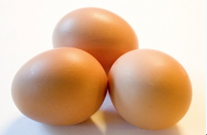The Truth about Eggs
Whenever we talk about eggs, many would say: “it has cholesterol and we should limit its intake”, “it’s better to eat the egg white and spare the yolk”, or “we shouldn’t eat more than 2-3 eggs per week”. This is not without some truth, as one single egg contains as much as 220 mg of cholesterol while 300 mg is the recommended upper limit of cholesterol intake per dayi. So, does this prove the common belief that we should eat as few eggs as possible?

The Egg: A Nutritious Food
Eggs are rich in protein, while the yolk contains unsaturated fat, vitamin B complex and iron. These nutrients have major functions as follow:
- Protein helps with body growth, repairs cells, and serves as a key component for metabolism.
- Unsaturated fat helps to lower the level of ‘bad’ cholesterol (low-density lipoprotein cholesterol).
- Vitamin B complex helps metabolise carbohydrates, protein and fat, thus enabling food to be converted into energy for body usage.
- Iron helps with the production of red blood cells and thus prevents anaemia.
| Nutrition Facts of a Large Egg (~60g)︰ | ||||||||||||||||||
|
||||||||||||||||||
| Source: National Nutrient Database of the United States Department of Agriculture |
Most of the Cholesterol in Blood is Produced by the Liver
The relationship between dietary cholesterol and those produced by our liver is complex. Basically, most of the cholesterol in our body is produced by the liver, and only a small amount comes from our diet. Healthy individuals are able to maintain their cholesterol at a normal level since our body is able to balance dietary cholesterol intake with hepatic cholesterol production.
Hence, high in cholesterol as it is, the egg is nutritious in general. Moreover, as only a small amount of cholesterol in our blood comes from diet, it is not necessary for healthy individuals to avoid eating eggs. However, those who had an egg that day should avoid consuming other high-cholesterol foods or food that contains eggs. Examples are squids, eels, cakes and egg tarts. This is to prevent exceeding 300 mg of cholesterol intake, which is the recommended upper limit per day. Individuals with hyperlipidemia should seek advice from dietitians or doctors.
| Recommended Daily Intake of Meat, Fish, Egg and Alternatives︰ | ||||||
|
||||||
|
^1 large size egg (~60g) =1 serving of meat *1 tael=meat in the size of a table tennis ball (1serving of meat) |
i Centre for Food Safety
To know more about …
- healthy eating, please visit ‘Health Zone’ website at http://www.cheu.gov.hk
- ‘Health@work.hk Project’, please visit http://www.healthatwork.gov.hk
 Top
Top



